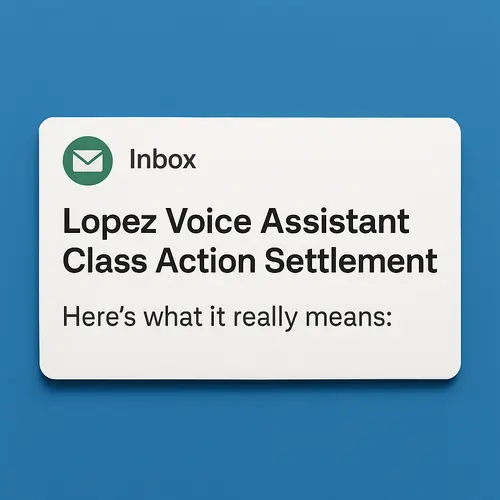That Class Action Email About Your Voice Assistant?
It’s Real — And Here’s Why It Matters
Last Tuesday morning, while deleting the usual mess of promotional emails, one subject line caught my attention:
"Notice of Settlement in the Lopez v. Voice Assistant Technology Class Action Lawsuit."
It looked like legal spam at first, but something about it made me pause. Maybe it was the words “class action”—I mean, who doesn’t dream of a surprise check in the mail? So, I opened it. And I’m glad I did.
Because as it turns out, this email wasn’t spam. It was about a real lawsuit involving the voice assistant technology many of us use every single day—and how it might have been quietly recording us all along.
What’s the Lopez Lawsuit About?
The email explained that the case—Lopez v. Voice Assistant Tech Companies—alleged that major tech firms were recording and analyzing users’ voice interactions without proper consent.
Think of Siri, Alexa, Google Assistant, or even your smart TV’s voice search. The claim is that these devices captured and stored snippets of conversations even when users didn’t explicitly activate them. And that this happened without clear disclosure.
The companies named in the lawsuit didn’t admit wrongdoing. But they’ve agreed to a settlement, which is often code for: “Let’s put this behind us quietly.”
Why You Got the Email
If you received the same message, it means you likely used one of the voice assistant products involved in the lawsuit between 2016 and 2023 (dates vary by device and brand). Maybe you used a smart speaker, voice-enabled smartphone, or even a car infotainment system.
These settlements are required by law to notify potential class members. You don’t have to join, but they want to give you a chance to do so—and maybe collect a little money for your troubles.
What the Settlement Offers
The short version: money and promises to do better.
• Monetary Compensation
If you’re eligible and submit a claim, you could receive a payout. The actual amount depends on:
• How many people file claims
• How much you used the device
• The total amount in the settlement fund
Past settlements in similar cases have resulted in payments between $5 and $40 per person. It’s not life-changing money, but it’s something—and it reinforces accountability.
• Privacy Commitments
Aside from money, the companies involved have agreed to improve their data practices. This might include:
• Clearer privacy disclosures
• Options to delete voice recordings
• Changes to how your voice data is used to train AI models
That last point is key—because in many cases, your voice was being used to help these systems learn, without your knowledge.
How to File a Claim (It’s Easier Than You Think)
Here’s what to do:
1. Check the Email for a Claim ID or Link
It should include a secure URL to the settlement website.
2. Go to the Official Website
Make sure it looks legit. Many of these sites end in .com or .org and have HTTPS security.
3. Fill Out the Claim Form
It’s usually just your name, contact info, and a brief confirmation that you used the service/device.
4. Submit Before the Deadline
That’s usually listed in the email. Miss it, and you lose your chance to receive anything.
If you’d rather not be involved, you can opt out—but then you also give up your right to claim any money.
Is This a Scam?
I double-checked. The email I received was real.
But here’s how to be sure:
• Google the case name and check if it appears on reliable legal or news sites.
• Visit the settlement administrator’s website (listed in the email) and see if it’s linked from official legal documents.
• Check for .gov or .org sources, or consumer protection alerts from the FTC.
Be cautious of any site asking for your full Social Security number or banking details—legit settlements don’t need that to pay you.
What This Means for You (and for the Future)
The big takeaway? Our voices are valuable—and companies know it.
When we use voice assistants, we’re training massive AI systems behind the scenes. That’s not necessarily bad—but it has to be consensual, transparent, and optional.
This incident is yet another indication of how the public is becoming aware of the privacy hazards posed by intelligent technology. Voice assistants have become a regular feature of our life; they are no longer curiosities. We still have to pose challenging inquiries regarding the operation of these tools and the management of our data.
Final Thoughts
If you got that email and thought it was spam, it’s not. If you’re eligible, take the few minutes to file a claim. And even if you don’t, take this as a gentle nudge to:
• Review your voice assistant’s privacy settings
• Check what recordings are stored
• Consider what you’re giving away—without even realizing it
We live in a world where convenience is king. But that convenience shouldn't come at the cost of our privacy.
TL; DR
• The Lopez Voice Assistant Class Action involves companies allegedly recording users without consent.
• If you received the notice, you may be eligible for a payout.
• Filing a claim is quick and easy—usually just a few clicks.
• The settlement pushes companies to improve privacy protections.
• Take this as a chance to check your own device settings and
reclaim a little control.













Write your comment